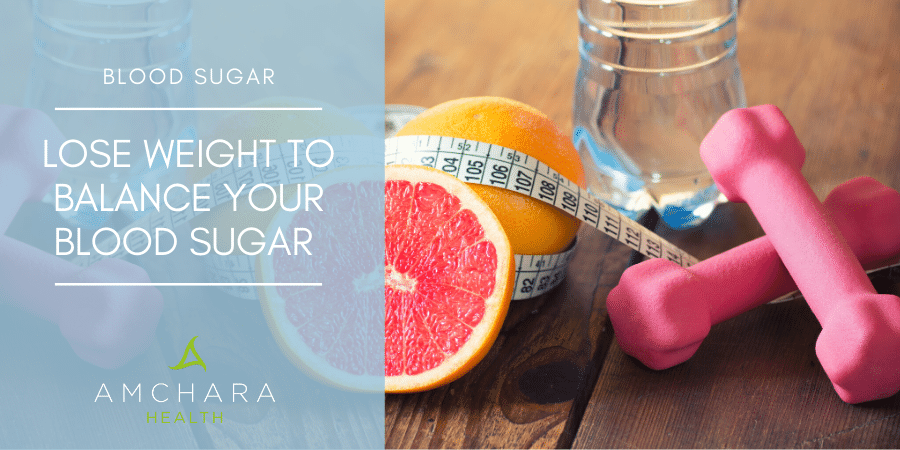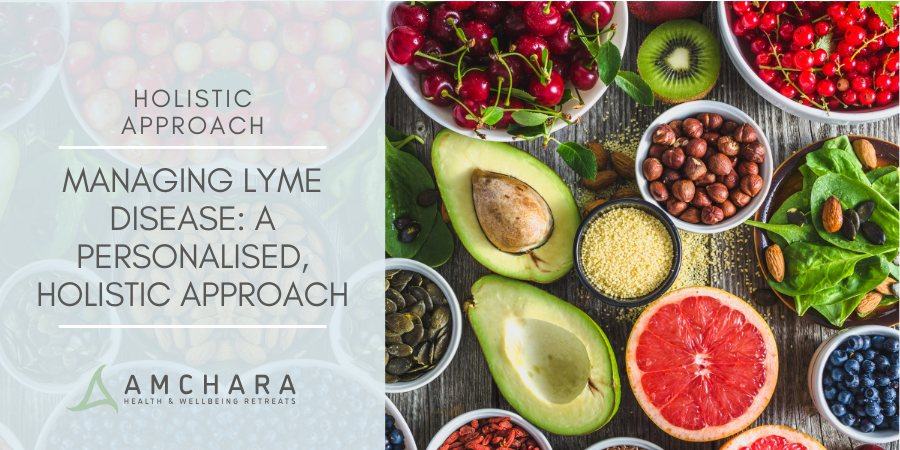A wealth of evidence links excess weight with blood sugar balance and insulin resistance. In this blog we’ll take a closer look at the relationship between your body weight and blood sugar control. We’ll also provide you with strategies to help you control your weight.
The importance of blood sugar control
Having balanced blood sugar is crucial for maintaining a steady stream of energy to your body’s cells. If you aren’t able to control your blood glucose, the brain becomes starved of energy and sends a really strong message to you to eat.
When food is consumed, your pancreas produces insulin causing sugar to be taken into the cells and used for energy.
Over time the insulin surge caused when you are constantly eating or snacking tends you towards storing away excess energy as fat, which doesn’t have a chance to be burned off. This is why disordered blood sugar levels are so closely linked to gaining weight.
Eventually, if insulin levels are constantly high, your body cells stop listening to its message and more and more insulin is needed to achieve the same effect – this is known as insulin resistance.
Excess weight and insulin resistance
But what about the relationship in the other direction – how does overweight contribute to insulin resistance?
We know losing weight cuts the risk of insulin resistance developing into Type 2 diabetes. One study on overweight people found losing between 5-7% of body weight led to a 58% reduction of the development of Type 2 diabetes, and this effect was ongoing (1).
It’s thought losing weight may improve the functioning of the cells in the pancreas which produce insulin, especially in the first few minutes after eating.
Some studies have observed that people who have lost weight appear to be more sensitive to insulin than lean people who have never been overweight. This could be because gaining weight increases the amount of fat cells, while losing the weight again may make them more insulin sensitive.
Obesity, especially when combined with a sedentary lifestyle, is often correlated with an accumulation of fat in the liver and muscles. This can have the effect of reducing the uptake of glucose by the muscles’ cells (2).
So you can see it can become a vicious cycle – blood sugar imbalance and insulin resistance can predispose the body to gain weight, while excess weight worsens insulin sensitivity.
All fat is not equal
Fat cells are often thought of as inanimate cells, simply storing excess fat, which can be burned off when you restrict your calorie intake. In fact, fat cells are dynamic and secrete all kinds of hormones and chemical messengers.
There are also different types of fat. One type sits around the abdominal organs deep inside the body, away from the surface of the skin. It’s known as visceral fat or belly fat and is strongly connected with insulin resistance and other metabolic diseases. This is because these types of fat cells release inflammatory messengers. Due to the location of the fat, these substances can easily access the bloodstream and be carried around the body.
Inflammation is a major cause of insulin resistance. We don’t fully understand yet why, but it may be connected with the pathways used to bring the messages from both insulin and inflammatory chemicals, which are believed to be similar.
Women with a waist circumference in excess of 35 inches, and for men more than 40 inches, may have an accumulation of belly fat, particularly when combined with a high waist-to-hip ratio. The amount of visceral fat is more closely correlated with the development of Type 2 diabetes than BMI.
Losing weight when your cells are resistant to insulin makes life difficult because your brain is constantly telling you to eat, despite there being plenty of energy available stored away in your fat cells.
A key to losing weight therefore is to correct insulin resistance.
More than simply calories
You’ll commonly see weight loss stripped down to a very simple formula – decrease your intake of calories to fewer than you’re burning off and you will lose weight.
While there’s no denying the mathematics of this, because we are all unique with different genes, health histories, gut bacteria and lifestyle, our bodies will respond differently and this can alter how we respond to the calories in food.
Bear in mind also that all calories are not created equal. What is much more important than simply the calorific value is the type of food you’re eating and when you eat it.
Weight loss tips
The following are some of our favourite actionable weight loss tips:
- Go slowly
Rapid weight loss does not improve insulin sensitivity as effectively as slow, controlled loss of weight. Crash diets aren’t usually successful at keeping weight off in the long term. Aim for a weight loss of between 1-2lbs per week.
- Change your attitude to food
Make sensible food choices – limit sugary and processed foods, emphasise plant based foods and good quality protein. A sweet tooth can be retrained over time.
Protein helps slow the release of energy from a meal. Because of this it’s great to include protein with your breakfast to help stabilise your blood sugar throughout the day and reduce sugar cravings.
Some fat is necessary – coconut oil containing medium chain triglycerides is directly used for energy by the liver. Omega-3 fats are needed for healthy cell membranes and control of inflammation but they are not preferentially stored in our fat stores.
Make sure half your plate is filled with vegetables, concentrated sources of vitamins, minerals and antioxidants. They’re naturally lower in calories because of their fibre content and will keep you feeling full for longer. It’s a good idea to make sure you eat a variety of different coloured vegetables to ensure a good range of nutrients.
A little like a sweet tooth, as your new food choices result in you attaining your weight loss milestones, you’ll find these foods become much more appealing to you.
- Beware of empty calories
By this we mean foods or drinks laden with calories yet not containing much in the way of nutrients alongside those calories. Think sweetened fizzy drinks, alcohol, cakes and biscuits.
Both a chocolate bar and a date and nut bar as a snack will contain plenty of calories but the date bar will also contain protein and essential fats from the nuts, so you are taking in extra nutrition alongside your energy. This protein, along with the fibre in the fruit will slow down the sugar release, so avoiding blood sugar peaks and a rush of insulin.
If you do buy these types of snacks, make sure they are only sweetened with whole fruits and contain no added sugar or fruit juice. Or better still, make your own.
- Carb control
Carbohydrate foods have the greatest effect on blood glucose levels. Some people find low carbohydrate eating plans such as ketogenic eating very effective for weight loss and stabilising blood sugar levels.
If you do eat carbs, pick them wisely. Avoid processed foods and sweet treats and instead choose starchy veggies, fruit, beans and legumes.
- Watch your portion sizes
The old adage of eating off a small plate really does work. Put leftovers out of sight so you’re not tempted to absentmindedly help yourself.
- Don’t forget fasting
We’re conditioned by food manufacturers to believe there’s something terrible about feeling hungry and we must eat the minute the hunger pangs kick in. In fact the human body evolved over many years of feast and famine and research is finding the metabolism seems to prefer this, as periods of fasting allow your body to reset and repair its own tissues. If you’re constantly eating frequently these self-cleaning mechanisms don’t have a chance to occur – plus you never have a chance to burn off stored fat.
In many studies involving a form of fasting called time-restricted eating, which involves a 16 hour gap between meals during a 24 hour period, participants were surprised they didn’t feel hungry when not eating.
- Load up on fibre
Fibre will not only fill you up but will also feed the beneficial gut bacteria in your microbiome. Studies have shown the population of friendly bacteria in your gut can be linked to your weight (3).
- Hydrate
Many people mistake thirst for hunger. If you do feel hungry, sip some water or super-hydrating coconut water and you may find the hunger pangs go away.
- Eat mindfully
This means anticipating the food, eating slowly, chewing really well (aim for around 30 times per mouthful), sitting down to eat and being in a relaxed state of mind. Not only will this improve your digestion, but you’ll eat less.
The message from your stomach doesn’t have time to reach your brain if you eat quickly, but equally you may not register its message if you’re engrossed in something else. How many times have you eaten a meal while surfing the internet or watching TV and you hardly remember eating it?
- Be physically active
You will burn off more calories if you are active, regardless of your genes. Even small changes such as taking the stairs instead of the lift add up over time. Weight loss which includes exercise has been found to have a greater effect on insulin sensitivity.
- Don’t be hard on yourself
It’s not all about willpower. Many people try to lose weight, end up being unsuccessful and give up, blaming themselves for lack of staying power. As we’ve noted, we’re all different and there is no one-size fits all weight loss plan. So remember there could be many reasons why a particular strategy dd not work for you.
Takeaway
Adopting the measures above can start you on your journey towards optimal health, but losing weight can be easier with some outside help to motivate you. A consultation with an Amchara Personalised Health practitioner can investigate your personal metabolism, genetic makeup and health history to help you reach your weight loss goals.
Please remember these guidelines are general recommendations and may not suit everybody, especially those with specific health issues. In particular, if you are taking medication for diabetes do not change your dose without consulting your GP.
We believe sharing knowledge and experience is an important part of achieving optimal health and would love to hear your views and experiences.
Have you started your weight loss journey?
Tell what you found useful about this article.
Please share your thoughts and tips in the comments.
Read this next:




